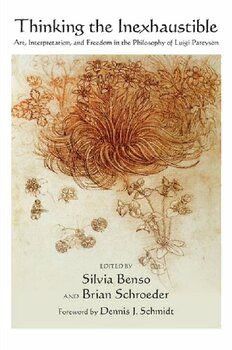
Thinking the Inexhaustible: Art, Interpretation, and Freedom in the Philosophy of Luigi Pareyson PDF
Preview Thinking the Inexhaustible: Art, Interpretation, and Freedom in the Philosophy of Luigi Pareyson
Thinking the Inexhaustible SUNY series in Contemporary Italian Philosophy ————— Silvia Benso and Brian Schroeder, editors Thinking the Inexhaustible Art, Interpretation, and Freedom in the Philosophy of Luigi Pareyson Edited by Silvia Benso and Brian Schroeder Foreword by Dennis J. Schmidt Published by State University of New York Press, Albany © 2018 State University of New York All rights reserved Printed in the United States of America No part of this book may be used or reproduced in any manner whatsoever without written permission. No part of this book may be stored in a retrieval system or transmitted in any form or by any means including electronic, electrostatic, magnetic tape, mechanical, photocopying, recording, or otherwise without the prior permission in writing of the publisher. For information, contact State University of New York Press, Albany, NY www.sunypress.edu Library of Congress Cataloging-in-Publication Data Names: Benso, Silvia, editor. | Schroeder, Brian, editor. Title: Thinking the inexhaustible : art, interpretation, and freedom in the philosophy of Luigi Pareyson / edited by Silvia Benso and Brian Schroeder. Description: Albany, NY : State University of New York, 2018. | Series: SUNY series in contemporary Italian philosophy | Includes bibliographical references and index. Identifiers: LCCN 2017034948 | ISBN 9781438470252 (hardcover : alk. paper) | ISBN 9781438470276 (ebook) Subjects: LCSH: Pareyson, Luigi. Classification: LCC B3636.P364 T45 2018 | DDC 195—dc23 LC record available at https://lccn.loc.gov/2017034948 10 9 8 7 6 5 4 3 2 1 Contents Acknowledgments vii Foreword ix Dennis J. Schmidt Introduction: Thinking the Inexhaustible 1 Silvia Benso and Brian Schroeder 1. Luigi Pareyson: A Master in Italian Hermeneutics 11 Silvia Benso 2. When Transcendence Is Finite: Pareyson, the Person, and the Limits of Being 29 Antonio Calcagno 3. Pareyson’s Role in Twentieth-Century Italian Aesthetics 43 Paolo D’Angelo 4. Pareyson vs. Croce: The Novelties of Pareyson’s 1954 Estetica 61 Umberto Eco 5. On Pareyson’s Interpretation of Kant’s Third Critique 81 Massimo Cacciari 6. Pareyson’s Aesthetics as Hermeneutics of Art 93 Federico Vercellone 7. The Unfamiliarity of Kindredness: Toward a Hermeneutics of Community 105 Robert T. Valgenti vi Contents 8. Truth as the Origin (Rather Than Goal) of Inquiry 123 Lauren Swayne Barthold 9. The “I” Beyond the Subject/Object Opposition: Pareyson’s Conception of the Self Between Hegel and Heidegger 139 Paolo Diego Bubbio 10. From Aesthetics to the Ontology of Freedom 159 Gianni Vattimo 11. Evil in God: Pareyson’s Ontology of Freedom 169 Martin G. Weiss 12. Philosophy and Novel in the Later Pareyson 185 Sergio Givone Bibliography 201 Contributors 205 Index 211 Acknowledgments We are deeply appreciative for the encouragement and support of this volume that we have received from many people. We are especially grateful to Prof. Claudio Ciancio, president of the Centro Studi Filosofico- Religiosi Luigi Pareyson in Turin, Italy; and Dr. Antonella Galbiati at Mursia Editore. Their assistance was invaluable in helping us secure the rights for the English translation of some of the essays contained in this volume and already published in Italian as part of the 2011 issue of the Annuario Filosofico, the philosophy yearly journal founded by Pareyson and some others in 1985. We are, as always, indebted to Andrew Kenyon and the staff at SUNY Press for their enthusiastic backing of this volume and their unfailing support of the Series in Contemporary Italian Philosophy. We also extend our most sincere appreciation to the contributors of this volume for their excellent work and patience. Without them this work would not have been possible. It is noteworthy that the publication of this volume occurs during the centennial of Luigi Pareyson’s birth. May this timing be an auspi- cious testimony to and gesture of appreciation for the significance of his philosophical thought. vii Foreword Dennis J. Schmidt One realizes the importance of translation in the history of philosophy when one discovers an original body of work that has not had the same impact outside its native language as it has had in its original language. Because linguistic borders are difficult to cross, significant contributions to philosophy that have had a profound influence in their own linguistic sphere can go largely unnoticed in other languages. Until quite recently, such was the fate of the work of Luigi Pareyson, who is undeniably one of the singular and key voices in post–World War II Italian thought yet who has remained mostly a rumor in the Anglophone world. Fortunately, thanks to recent translations and to this volume of essays, that fate has changed and Pareyson will now be more accessible.1 The essays in this volume will do much to unfold the complexities of Pareyson’s work and to engage the wide range of his contribution to philosophy. Nonetheless, a few remarks situating Pareyson’s thought in its larger contexts might help to further introduce him to those as yet unfamiliar with his complex and original philosophical project. The scope of Pareyson’s thought spanned over five decades from the end of the Second World War through the student movements of the late 1960s up to the late 1980s; he wrote books about themes such as existentialism, aesthetics, German Idealism, truth, religion, evil, and freedom, as well as on figures such as Vico, Jaspers, Fichte, Schelling, and Dostoevsky. In short, his career cuts a broad path through key concerns of our times as well as pivotal figures in intellectual history. Deeply committed to the ix
